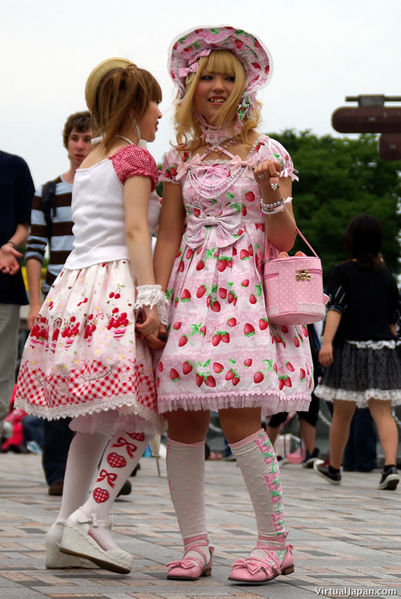 Lolita fashion is a style of dress orginated in Japan. Although "Lolita" is a reference to Vladimir Nabokov's famous novel, and Lolita is often worn by teens, most adherents present themselves as Victorian children or baby dolls and prefer to look "cute" rather than "sexy".
Lolita fashion is a style of dress orginated in Japan. Although "Lolita" is a reference to Vladimir Nabokov's famous novel, and Lolita is often worn by teens, most adherents present themselves as Victorian children or baby dolls and prefer to look "cute" rather than "sexy".Japanese culture places a higher value upon extremely youthful appearance and behaviour than Western, and some adult women buy large amounts of products, such as Hello Kitty goods, that are typically marketed only to children in the West. Lolita fashion is perhaps a more visible extension of this phenomenon.
In general, Lolita fashion tends to imitate Victorian-style girl's clothing and often aims to imitate the look of Victorian porcelain dolls. Skirts are knee length and may have a crinoline or petticoat to add volume. As in mainstream Japanese fashion, over-knee socks or stockings are extremely popular. Black fishnet stockings and white or black tights are also common. Shoes or boots with high heels - though not usually stiletto heels - such as Mary Janes, complete the look. Frilly, ruffled or lace-trimmed Victorian blouses are also popular especially with "Gothic Lolita" types, who may also favour long skirts and jackets rather than overtly "childish" designs. Apart from the occasional shortness of skirts, designs are usually modest, sometimes with long lace-capped sleeves. Lace headdress and bracelets are usually worn.
Lolita Styles
 The Lolita look can be classified into "Sweet Lolita", "Classical Lolita", "Gothic Lolita" and "Kimono Lolita".
The Lolita look can be classified into "Sweet Lolita", "Classical Lolita", "Gothic Lolita" and "Kimono Lolita".Classic Lolita
They are more traditional, look more like the Victorian fashion, light-coloured, also more mature-looking. Traditional Maid-style clothing and Alice in Wonderland-style apron may be classfied into this genre.
Gothic Lolita
Influenced by certain elements of gothic fashion, this has probably become the most popular style within Lolita fashion and certainly the most recognized in the west. This style started as a youth subculture sometime around 1997/1998 and became a well-established genre available in various boutiques and some major department stores by around 2001. Some observers consider it a reaction to the "Kogal" aesthetic.
Gothic Lolita clothes are usually black in color, or with a dark theme. Makeup is usually dark in color, in contrast with other Lolita genre where lovely and light color makeup is preferred. Black eyeliner is typical. A pale complexion is preferred, so white foundation might be used. Red or black lipstick is usually seen.
Goken Lolita outfits may be accessorized with other props like conspicuous pocketbooks, hatboxes, handbags and other bags, sometimes in the shape of bats, coffins, and crucifixes. Teddy bears and other stuffed animals are also common, and some brands make special "goken" teddy bears out of black leather or PVC. Also, many Goken Lolita own Super Dollfies and carry them around.
Gothic Lolita was influenced and popularised by the imagery of more feminine Visual Kei (or "visual rock") bands. Visual Kei is a Japanese form of rock music defined by bands featuring performers in elaborate costumes but whose musical style varies. Mana, the crossdressing former leader and guitarist of the Visual Kei band Malice Mizer is widely credited for having helped popularise Gothic Lolita. He coined the terms "Elegant Gothic Lolita" (EGL) and "Elegant Gothic Aristocrat" (EGA) to describe the style of his own fashion label Moi-même-Moitié, which was founded in 1999 and quickly established itself as one of the most coveted brands of the Gothic Lolita scene.
Sweet Lolita
They have lots of lace and ribbons, usually light-colored (although there are black/white sweet lolita), attempting to look as cute and little-girlish as possible. End results typically exudes a doll like appearance.
Kimono Lolita
As the name suggest, they are crossover of Kimono and lace-featured skirt.
Lolita Culture
In Japan it is mass-marketed and has wide visibility particularly in the streets of Tokyo and Osaka, on television, in manga and computer games. Outside of Japan it is still a fringe fashion, although it has been spreading slowly to other regions and countries (for example, Hong Kong has a number of Lolita outlets). Lolita, along with Cosplay and other Japanese cultural phenomena, can sometimes be seen at concerts and anime conventions throughout Europe and the United States. Although being a fringe fashion, there are plenty of dedicated fans filling the gap. Lolita magazines are widely available for purchase on the internet and at Japanese bookstores, which also deal in anime and manga. Adherents outside Japan often sew their own homemade Lolita outfits, sometimes offering them for sale to make up for the difficulty of acquiring them from Japan.
No comments:
Post a Comment